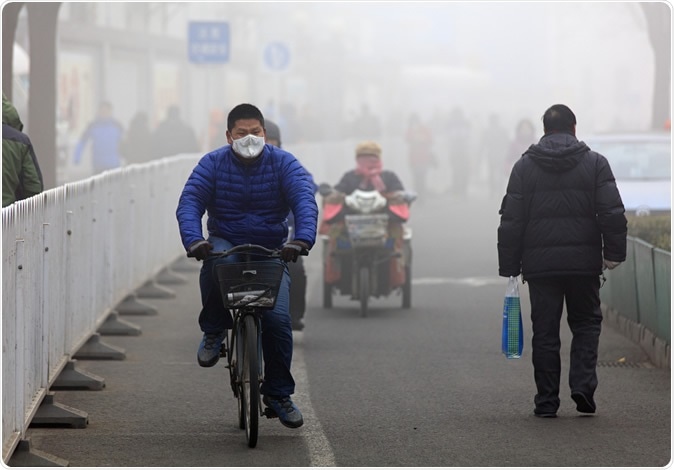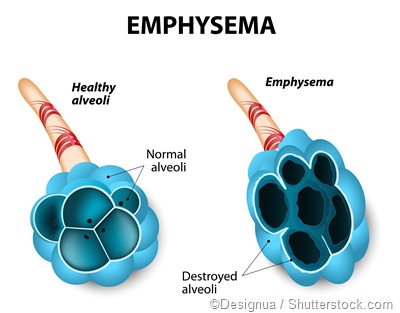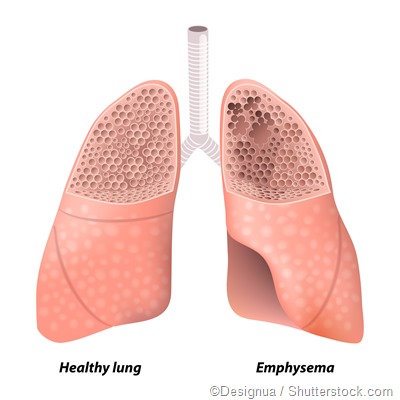A new study funded by the NIH says that increasing rates of the chronic lung condition called emphysema are linked to breathing polluted air over a long period. The progression of emphysema, a condition more commonly linked to smoking, is now also being attributed to polluted air. Air pollution is already known to be associated with lung and cardiovascular disease.

Image Credit: Shutterstock
The present study published in JAMA: The Journal of the American Medical Association compared percent increase in emphysema in relation to the baseline levels of air pollutants around the residences of the participants, over a period ranging from 11 to 18 years.
Emphysema occurs when the lungs are damaged by toxins, leading to a significant decline in the elasticity of the lung tissue. This causes them to remain permanently inflated even after breathing out, which in turn means a loss of air movement in and out of the lungs. The end result is that oxygenation of the blood in the lungs is impaired as less air moves into the lungs with each breath.

Patients with emphysema find it difficult to breathe and have persistent cough with phlegm production. The breathlessness deprives them of normal social interactions and reduces their capability for physical activity. It makes it more difficult for them to work, and may affect their emotional status. Emphysema is often a chronic and slow process than an acute one. While there is no way to cure this disease, medications and other therapies may help to control the clinical symptoms.

The high rate of emphysema makes it a priority to understand more about it and learn how to manage it better. The current study is important because it examines some factors that lead to or contribute to the worsening of this condition, in a large group of participants who come from a variety of environments and racial backgrounds.
The current study used computed tomography (CT) imaging as well as lung function tests to measure the percentage change in the severity of emphysema, as well as estimated baseline concentrations of four major air pollutants in the air likely to be breathed by the participants at the outset of the study. These pollutants comprise gaseous ozone, very small particles called PM2.5 because of their microscopic fineness, oxides of nitrogen, and black carbon
Patients from six different metropolitan locations participated in the study, which was drawn from the Multi-Ethnic Study of Atherosclerosis (MESA). More than 7000 patients took part, both men and women. Each participant had up to 5 CT scans to assess the emphysema, and up to 3 lung function tests.
The study ran for several years, from 2000 to 2018, which allowed the patients to be assessed by multiple CT scans. This gave the researchers a better understanding of how emphysema progressed in the lungs over this period. The researchers found that the effect of multiple pollutants was more damaging to the lungs than when each was studied in isolation.
The scientists assessed the concentrations of all the important air pollutants at baseline very carefully. Using over 15 000 CT scans taken during this period, they also looked at the percentage increases in emphysema in the participants. They found that among the four types of air pollutants mentioned above, the baseline levels of ozone and nitrogen oxides was proportional to longitudinal increases in the percentage of emphysema. This relationship was not observed with PM2.5. Another significant finding was the increased speed with which one lung function parameter, called the forced expiratory volume in the first second, decreased with an increase in the baseline levels of ozone in the environment.
This study is set apart from other similar research by its diligent tracking of both lung changes and exposures to air pollutants over the same period. James Kiley at the National Heart, Lung, and Blood Institute (NHLBI), says, “These findings may offer one explanation for why emphysema is found in some people who never smoked. The study's results, duration, and timing offer insight into the long-term effects of air pollution on the U.S. population.”
David Goff, also of the NHLBI, says, “We need to assess the effectiveness of strategies to control air pollutants in our efforts to improve heart and lung health. At the same time, people need to remember the importance of a healthy diet, physical activity, and smoking cessation for overall health.”
Journal reference:
Wang M, Aaron CP, Madrigano J, et al. Association Between Long-term Exposure to Ambient Air Pollution and Change in Quantitatively Assessed Emphysema and Lung Function. JAMA. 2019;322(6):546–556. doi:10.1001/jama.2019.10255, https://jamanetwork.com/journals/jama/article-abstract/2747669